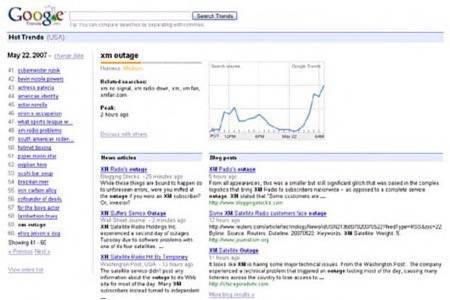Google today launched an improvement to their Trends service, Hot Trends, which lists the top 100 break out searches of each day. These are not the top searches, but the ones that deviate the most from their normal search pattern.

Clicking on a trend leads to a page that includes news, blogs, and web searches in an attempt to explain why that search term might be as popular as it is. For example, today “bubonic plague” checks in at #70 because yesterday’s news story about a capuchin monkey at the Denver Zoo dying of the disease. The results are, of course, not always perfect.

For example, this week’s XM radio outage story takes up six different spots on today’s Hot Trends list. It would probably be more useful if Google’s algorithm attempted to group related searches into a single topic (or at least gave that option). Also, as Duncan Riley of Techcrunch points out, the very odd term”legless chihuahua” appeared in two spots on yesterday’s trends list (though apparently spurred by a news story about, you guessed it, legless chihuahuas that made its way across the wires over the weekend).
Other oddities appear across today’s list. The #14 search, for example, is “2004 world series champs” — which, as an Ameican baseball fan like myself knows, is the Boston Red Sox, but the trends page for that term shows no recent news or blog posts that would have caused that specific search rather than the more common search for the team’s actual name. Further, the searches appear to be coming out of Houston, Texas and Louisville, Kentucky, hardly bastions of Red Sox fandom. And why that would out rank #19 “whosarat.com” which was featured in a front page New York Times article this morning and widely reported across political blogs, is something of a mystery to me.
Google’s Hot Trends is essentially like Yahoo!’s list of “Buzz Index Movers” which lists the day’s top search gainers. Though Yahoo!’s list doesn’t give as much information as Google’s, it appears to have less peculiar listings upon first glance. That is perhaps because it is edited by humans. Strangely, there seems to be little overlap between the two lists.
Hot Trends could, of course, be very useful for Internet marketers and researchers studying how information flows and spreads across the web. It would be great if Google would offer API access to the service, especially with an expanded data set that included more frequent updates and a largest list of terms.
The search term “chihuahua puppies,” of the legged variety, appear’s on Yahoo’s list of top decliners today, down 97%. Maybe Paris Hilton switched search engines overnight.

















